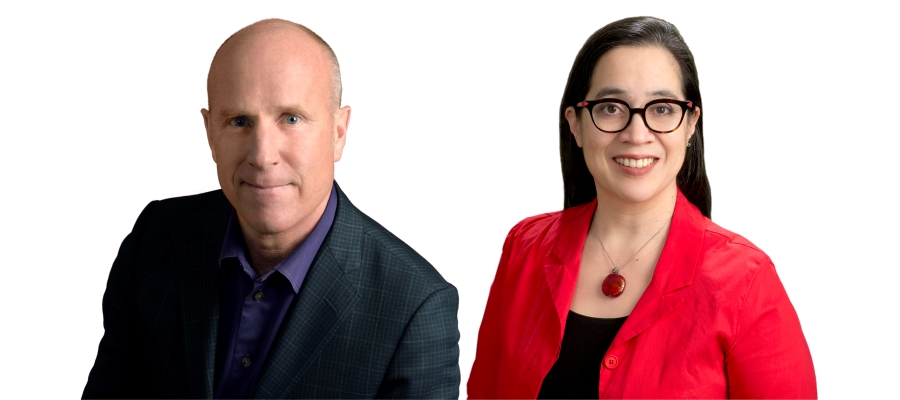

Fay Faraday and Bruce Ryder are not just co-instructors on Osgoode’s part-time Professional LLM in Constitutional Law.
The professors, who teach the Equality Rights course together, are also neighbours at the intersection of legal practice and legal academia.
“I always found that division unnecessary,” Faraday says. “There is such a huge gap between the two worlds, but I think that practising lawyers can learn a lot from the depth of critical analysis that academics engage in. At the same time, it’s important for an academic to understand how the law works in real people’s lives.”
And Faraday has not been afraid to put her philosophy into action. Before joining Osgoode’s faculty as a full-time member in 2018, she took every opportunity she could to teach as an adjunct or visiting professor.
Since her appointment, Faraday has also continued her work as a social justice lawyer, strategic adviser and policy consultant at Faraday Law, where she represents unions, community organizations and coalitions in constitutional and appellate litigation, human rights, administrative/public law, labour and pay equity.
“They inform each other in an important way,” Faraday says.
Meanwhile, Ryder’s 37-year tenure at Osgoode has been punctuated by numerous submissions and appearances for parties at appellate courts across the country, including the Supreme Court of Canada.
“I feel privileged to be both a member of the bar and a scholar of constitutional law,” he says. “It seems to me that the best legal educators are the ones who didn’t choose between the two, but blended them.”
Despite their shared views on the complementary nature of legal practice and academia, Ryder and Faraday arrived at their conclusions from opposite directions.
For Faraday, her enrolment as an LLB student at Osgoode Hall Law School in the late 1980s was the culmination of a lifetime’s experience.
Growing up in an immigrant family as a member of the Filipino-Canadian community, she had been exposed from a very early age to the challenges faced by migrant workers from a racial minority with temporary status in the country and planned to use her law degree to bring them some measure of justice.
“I’m one of those few people who go to law school with a very clear vision of what I was aiming to do,” Faraday explains. “I wanted to work with workers and I’ve been fortunate enough to do exactly that.”
By contrast, Ryder started his legal studies equally determined to avoid practicing law after graduation.
“I was never very interested in being a lawyer, and law school solidified that lack of interest,” he says. “I loved the intellectual side of it, so I was very grateful to go in an academic direction.”
“When I look back, my attitude was quite immature, but I really did think you had to choose between scholar and practitioner,” Ryder adds.
His stance on the practice of law has softened considerably in the decades since, thanks in part to the advice of his first Osgoode Dean, James McPherson, who had no time for Ryder’s protestations about his lack of interest in becoming a lawyer.
“He said I was talking nonsense and must get called to the bar,” Ryder says. “Once I was called, I realized that the overlap between being a constitutional scholar and an appellate advocate in constitutional law matters was nearly complete.”
Ryder says his career was perfectly timed for someone with his level of enthusiasm for constitutional law. For instance, his clerkship at the Supreme Court of Canada – where he worked under Justice Gerald Le Dain – coincided with the first wave of Charter cases to reach the nation’s top court. And when he arrived at Osgoode a few years later, the faculty was already populated by such luminaries in the field as Peter Hogg, Jamie Cameron and Patrick Monahan, among others.
“I’ve had the great fortune to be surrounded by giants of constitutional law at every stage of my career,” Ryder says.
According to Ryder, one of the great pleasures of his job is teaching on the Professional LLM in Constitutional Law, which he views as a kind of embodiment of the value of combining theory and practice in legal education.
“Everyone in the classroom has so much to contribute,” he says.
Faraday says she relishes the opportunity to take a deep dive into constitutional law matters with students from such a diverse range of professional backgrounds. Osgoode Constitutional Law LLM candidates typically include lawyers working in private practice and government, as well as non-legal professionals – each of whom has carved out a space in their career for deeper critical thinking on the subject.
“It builds a richness to the learning experience, because you have that experience under your belt,” Faraday says. “In my classes, there is always a lot of conversation and problem-solving around scenarios that are designed to probe deeper questions. It’s not unlike the way lawyers operate in practice: often working in teams and collaborating to solve problems. I feel very strongly that it’s a powerful way to learn.”
In the Equality Rights course in particular, Faraday and Ryder explore in detail with their students the rights protected by s. 15 of the Charter, with topics including the origins of the language in its text, theories of equality, remedies available for violations and the role of litigation in furthering progressive goals.
“It’s a fun program to be part of. I hope the students get as much out of it as I do,” Faraday says.
Wondering if the Professional LLM is right for you? Get information on course requirements, application dates, tuition and more!

